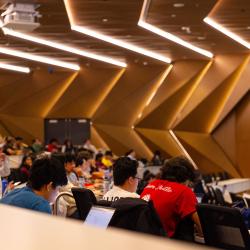Interdisciplinary AI Courses to Take This Spring at UMD
These 10 CMNS classes help undergraduates understand and apply artificial intelligence.

The University of Maryland offers an unparalleled educational experience in artificial intelligence (AI) through both innovative curriculum and cutting-edge research. This combination positions UMD students to be leaders in the AI landscape.
From solving Earth science challenges to transforming messy data to applying data science to genomics, UMD’s College of Computer, Mathematical, and Natural Sciences (CMNS) offers plenty of interdisciplinary AI classes taught by expert faculty members.
Now that it’s time to register for courses for the Spring 2026 semester, check out 10 unique options from CMNS for undergraduate students to study AI and learn its practical applications.
AOSC447: Machine Learning in Earth Science
How can machine learning techniques be applied to real-world problems in Earth science? This course, taught by Atmospheric and Oceanic Science Professor Xin-Zhong Liang, provides essential hands-on experience using the most popular open-source analytics tools based on Python. AOSC447 covers all steps in machine learning—from problem specification to data analytics to analytical solution—and applies statistical and analytical algorithms to uncover hidden data relationships and transform them into predictive understanding or decision support.
BCHM477: Biomolecular Measurement and Data Analysis
This class, taught by Chemistry and Biochemistry Associate Professor Jason Kahn, introduces data science approaches to “omics” data. Omics refers to research areas that end in -omics, including genomics, proteomics and other fields that analyze complete genetic or molecular profiles. Students in BCHM477 will be equipped with the tools and experience for productive collaborations with research scientists in industrial, clinical or academic contexts.
CMSC320: Introduction to Data Science
CMSC320 teaches students how to transform unstructured, messy data into actionable insights. The Department of Computer Science offers three sections of this course, taught by lecturers Fardina Alam, Anna Evtushenko and Maksym Morawski. The curriculum provides an introduction to the data science pipeline by covering statistical data analysis, basic data mining and machine learning algorithms, large-scale data management, cloud computing and information visualization.
CMSC421: Introduction to Artificial Intelligence
Taught by Computer Science Professor William Regli and Lecturer Sujeong Kim, this course introduces students to a range of AI concepts and methods. Topics include automated heuristic search, planning, games, knowledge representation, logical and statistical inference, natural language processing, computer vision, robotics, cognitive modeling and intelligent agents. Students obtain a hands-on feel for these topics by completing their own programming projects.
CMSC422: Introduction to Machine Learning
Machine learning has advanced significantly over the past 70 years. Taught by Computer Science Senior Lecturer Mohammad Nayeem Teli, this course provides a broad overview of existing methods for machine learning and an introduction to adaptive systems in general. The curriculum emphasizes the practical aspects of machine learning and data mining.
CMSC425: Game Programming
Students learn about game hardware and systems, the principles of game design, object and terrain modeling, game physics, artificial intelligence for games, aural rendering and more in this course taught by Computer Science Lecturer Stevens Miller. These topics are reinforced through the design and implementation of a working computer game.
CMSC426: Computer Vision
Computer vision allows computers to analyze and interpret images and videos. CMSC426, taught by Computer Science Associate Professor Jia-Bin Huang, introduces students to basic computer vision concepts and techniques. This includes image filtering and edge detection, 3D reconstruction of scenes using stereo and structure from motion, and object detection, recognition and classification.
CMSC454: Algorithms for Data Science
In CMSC454, students learn how to process high volumes of data. The fundamental methods in this curriculum include stream processing, locally sensitive hashing, web search methods, page rank computation, dynamic graph algorithms and more. The course is taught by Distinguished University Professor of Computer Science Aravind Srinivasan.
CMSC470: Introduction to Natural Language Processing
Taught by Computer Science Assistant Professors Rachel Rudinger and Sarah Wiegreffe, CMSC470 introduces students to fundamental techniques for automatically processing and generating natural language with computers. Students apply machine learning techniques in a series of assignments designed to address a core application, such as question answering or machine translation.
STAT426: Introduction to Data Science and Machine Learning
What is the math behind machine learning? In this introductory course taught by Mathematics Professor Wojciech Czaja, students study recent developments in the fields of data science and machine learning.






